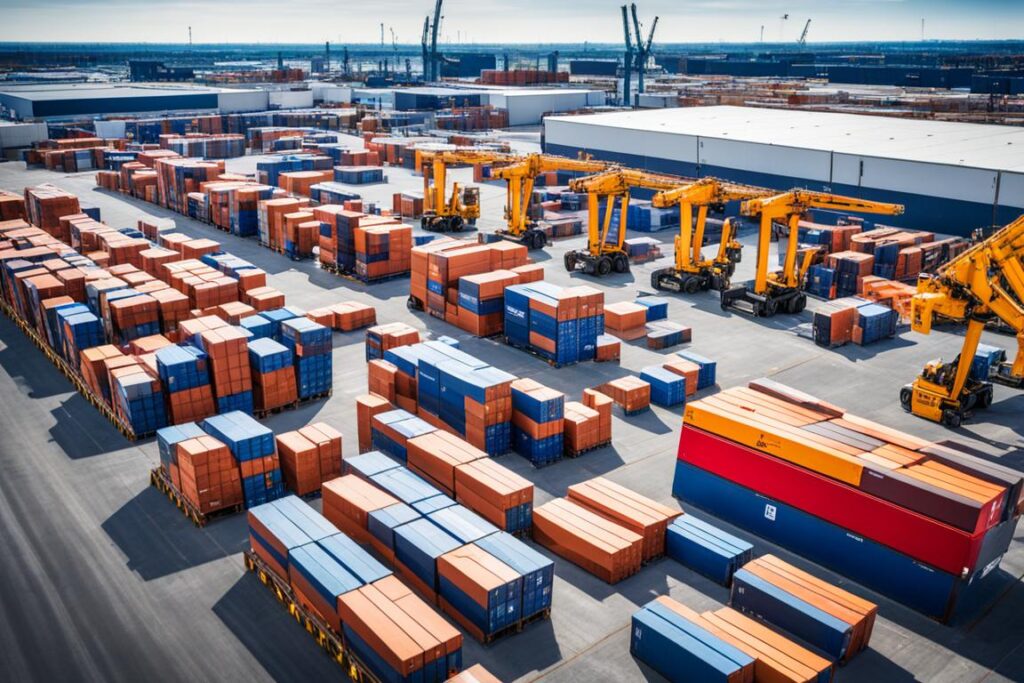Logistics optimization is the key to meeting the growing demand for fast and efficient supply chain operations. In today’s competitive market, businesses need to prioritize shipping efficiency and delivery solutions to stay ahead. Effective logistics management encompasses various strategies, including reducing costs, decreasing lead times, and enhancing customer satisfaction.
To achieve logistics optimization, businesses must first establish clear goals for their supply chain. By setting specific targets for each aspect of the logistics process, companies can measure performance and track progress. Furthermore, obtaining valuable customer feedback is essential for understanding pain points and making real-time improvements.
Teamwork and collaboration play a crucial role in successfully managing supply chain logistics. By encouraging cross-functional collaboration and emphasizing the importance of effective communication, businesses can streamline their operations and ensure smooth coordination among stakeholders.
By implementing these strategies, businesses can enhance their logistics operations, reduce costs, and deliver exceptional customer experiences. In the following sections, we will explore the concept of logistics optimization in more detail and discuss various approaches to effectively manage supply chain logistics.
Key Takeaways:
- Logistics optimization is essential for fast and efficient supply chain operations.
- Clear goals and performance measurement are crucial in effectively managing logistics.
- Customer feedback and teamwork play a vital role in making real-time improvements.
- Investing in logistics management software and data analytics can optimize operations.
- Improving communication and coordination leads to better logistics outcomes.
What is Logistics Optimization and Why is it Important?
Logistics optimization plays a crucial role in streamlining the movement of goods and services, ensuring efficient operations, and driving business success. By finding the most effective and cost-efficient ways to plan, organize, and execute logistics processes, businesses can achieve significant benefits in terms of cost reduction, lead times, and customer satisfaction.
One of the primary objectives of logistics optimization is to reduce costs throughout the supply chain. By analyzing various aspects of the logistics process, such as transportation routes, inventory levels, and warehousing strategies, businesses can identify areas where costs can be minimized without compromising the quality of service. This cost reduction directly contributes to higher profitability and financial stability.
In addition to cost reduction, logistics optimization also focuses on improving lead times. By optimizing transportation routes, utilizing advanced technology, and streamlining processes, businesses can significantly shorten delivery times, providing faster and more reliable service to customers. This improved efficiency not only enhances customer satisfaction but also gives businesses a competitive edge in the marketplace.
Customer satisfaction is a key driver behind logistics optimization efforts. By implementing efficient logistics strategies, businesses can ensure on-time deliveries, minimize order errors, and reduce product damage during transportation. These factors directly influence customer satisfaction levels, helping businesses build strong relationships with their customers and increase loyalty.
Furthermore, logistics optimization is essential for environmental sustainability. By identifying the most efficient distribution networks, optimizing transportation routes, and minimizing fuel consumption, businesses can reduce their carbon footprint and contribute to a greener and more sustainable future.
Overall, logistics optimization is a critical component of effective supply chain management. It enables businesses to reduce costs, improve lead times, enhance customer satisfaction, and contribute to environmental sustainability. By leveraging technology, data analysis, and strategic planning, businesses can optimize their logistics operations and drive success in today’s competitive market.
- “Logistics Optimization: Key Benefits for Supply Chain Management” – Supply Chain Digital
- “Importance of Logistics Optimization in Today’s Competitive Market” – Logistics Management Solutions
How to Effectively Manage Supply Chain Logistics
To effectively manage supply chain logistics, it is essential to establish clear goals for each aspect of the supply chain. Clear goals provide a roadmap for measuring performance and guiding improvements. By setting clear goals, businesses can track their progress and identify areas that require attention.
Performance measurement plays a crucial role in managing supply chain logistics. It involves monitoring and evaluating performance at each stage of the supply chain. By collecting and analyzing data, businesses gain valuable insights into the efficiency and effectiveness of their logistics operations. Performance measurement enables data-driven decision-making and helps identify opportunities for optimization.
Customer feedback is a valuable resource for managing supply chain logistics. By actively seeking and incorporating customer feedback, businesses can understand their customers’ pain points and preferences. This information allows for real-time adjustments, ensuring that logistics operations are aligned with customer expectations.
Teamwork and collaboration are vital components of effective supply chain logistics management. By fostering a culture of teamwork, businesses can encourage open communication and coordination among all stakeholders. This collaboration leads to a better understanding of the current state of the supply chain and allows for the implementation of strategic changes.
When managing supply chain logistics, it is crucial to keep clear goals, performance measurement, customer feedback, and teamwork at the forefront. By focusing on these key elements, businesses can optimize their logistics operations, enhance efficiency, and ultimately deliver exceptional customer experiences.
| Benefits of Effective Supply Chain Logistics Management | |
|---|---|
| 1 | Improved operational efficiency |
| 2 | Reduced costs through optimized processes |
| 3 | Enhanced customer satisfaction and loyalty |
| 4 | Increased visibility and transparency |
| 5 | Minimized risk and disruptions |
| 6 | Streamlined inventory management |
| 7 | Optimized use of resources |
7 Ways to Optimize Your Logistics Operations
Are you looking to improve the efficiency and effectiveness of your logistics operations? Here are seven strategies that can help you achieve optimal results:
1. Utilize Logistics Management Software: Leverage the power of logistics management software to gain actionable insights into your supply chain. This software enables you to forecast demand, plan routes, and exchange real-time information, enhancing your overall operational efficiency.
2. Enhance Communication: Effective communication is crucial in logistics. Improve coordination among stakeholders, both internally and externally, by implementing robust communication channels. Clear and timely communication reduces errors, streamlines processes, and ensures smooth operations.
3. Reduce Costs: Implement cost reduction measures by optimizing carrier selection and packaging. By carefully selecting carriers based on their performance and cost-effectiveness, you can maximize efficiency while minimizing expenses. Additionally, optimizing packaging reduces wastage, saving both time and money.
4. Invest in Employee Development: Nurture your workforce and invest in their development to build a skilled and knowledgeable team. Provide training programs, workshops, and mentoring opportunities to enhance their capabilities. Well-trained employees contribute to streamlined operations and improved customer satisfaction.
5. Harness the Power of Data Analytics: Embrace data analytics to make informed decisions and drive continuous improvement. With the help of analytics tools, you can analyze historical data, identify trends and patterns, and optimize your supply chain processes accordingly. Data-driven decision-making minimizes risks and maximizes efficiency.
6. Streamline Inventory Management: Implement efficient inventory management practices to prevent stockouts and reduce holding costs. Utilize inventory tracking technology to maintain optimal stock levels and ensure smooth order fulfillment.
7. Continuously Evaluate and Improve: Regularly assess your logistics operations to identify areas for improvement. Collect feedback from customers, employees, and suppliers to gain insights into pain points and implement necessary changes. A culture of continuous improvement fosters innovation and keeps your operations at the cutting edge.
By implementing these strategies, you can optimize your logistics operations, drive efficiency, and enhance customer satisfaction. Embrace the power of logistics management software, effective communication, cost reduction measures, employee development, and data analytics to stay ahead in the competitive world of logistics.



